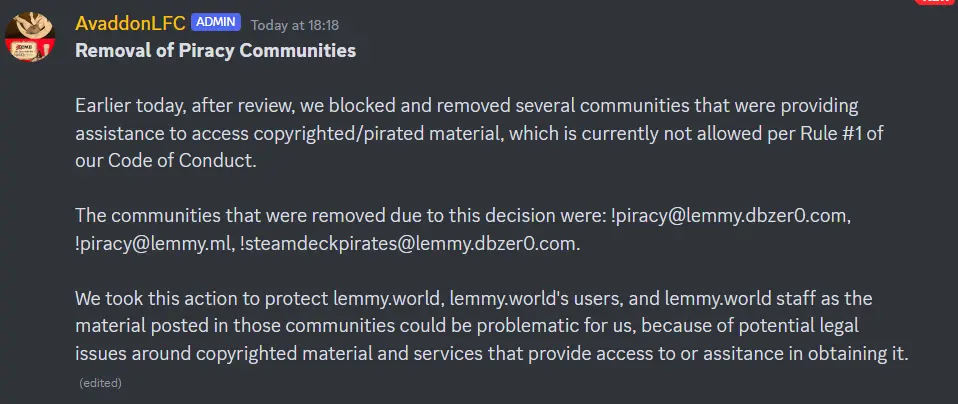cross-posted from: https://sh.itjust.works/post/2881638
The largest piracy community is hosted over at !piracy@lemmy.dbzer0.com
lemmy.world has blocked it. It appears to have also blocked !piracy@lemmy.ml.
If this is a problem for you, I’d suggest migrating accounts using LASIM to an instance that doesn’t block it (such as lemm.ee).
edit:
An official announcement has been made:




100% agree.
Serious question: what’s been stopping us from making a fully decentralized reddit, or social network in general?
Something that’s completely peer to peer based, where people themselves host the content they interact with, and have the freedom to hide whichever type of content THEY want?
Has it been purely a technical problem? Is there discourse on this concept?
It’s a technical set of problems.
What’s funny is truely distributed compute is totally possible today, thanks to a lot of work done in the blockchain community. Notice I said blockchain and not crypto, we don’t want the bullshit associated with that (coins, nfts etc). What we want is distributed compute and storage that can be read in a way that provides the same function as Reddit etc. Coupled with a good client experience like sync.
The biggest problem with that though is that blockchain that is truely distributed is slow by nature, because each block of data is distributed and validated to all nodes that host to keep consistency. And the larger a site becomes, the more data there is to store, and the more resource intensive verification becomes so therefore the nodes slowly gain a higher set of requirements.
So the middle ground is something like Lemmy. Where you can run your own instance, that talks to a wider federated network of instances where no one single entity can control the content.
In tech, a lot of the above is explained by a concept called CAP theorem. It’s a really interesting problem that has only really been solved by a few vendors (google spanner is a good one) but even then it doesn’t cover the distributed part.
Interesting, thanks for the insight.
That’s basically Lemmy though? Unfortunately, expecting non-technical people to host their own content and moderate their own experiences is too much work and not worth it or viable for most users. Reddit made it easy, and its user base was still tiny compared to the bigger social media platforms.
Lemmy is not peer to peer, it’s federated, which is a big difference.
Self hosting your content and moderating your own experience could be made super easy and trasparent, in theory, but I understand that actually implanting this kind of UX must not be an easy task. It does seem the only solution for a truly censorship free network tho.